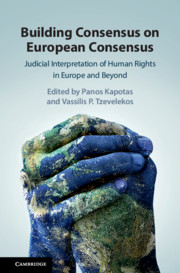 Building Consensus on European Consensus
Building Consensus on European Consensus Book contents
- Building Consensus on European Consensus
- Building Consensus on European Consensus
- Copyright page
- Contents
- Contributors
- Foreword
- Acknowledgements
- 1 How (Difficult Is It) to Build Consensus on (European) Consensus?
- Part I Understanding European Consensus
- Part II Appraising European Consensus
- Part III Consensus Analysis Outside the ECHR System
- 15 The Inter-American Court of Human Rights’ Tentative Search for Latin American Consensus
- 16 National Consensus and the Eighth Amendment
- 17 Levels of Generality in the Comparative Reasoning of the European Court of Human Rights and the European Court of Justice
- 18 Consensus as Challenge and Retraction of Rights
- 19 Building Consensus on European Consensus
- Index
18 - Consensus as Challenge and Retraction of Rights
Can Lessons Be Drawn from – and for – EU Citizenship Law?
from Part III - Consensus Analysis Outside the ECHR System
Published online by Cambridge University Press: 04 January 2019
- Building Consensus on European Consensus
- Building Consensus on European Consensus
- Copyright page
- Contents
- Contributors
- Foreword
- Acknowledgements
- 1 How (Difficult Is It) to Build Consensus on (European) Consensus?
- Part I Understanding European Consensus
- Part II Appraising European Consensus
- Part III Consensus Analysis Outside the ECHR System
- 15 The Inter-American Court of Human Rights’ Tentative Search for Latin American Consensus
- 16 National Consensus and the Eighth Amendment
- 17 Levels of Generality in the Comparative Reasoning of the European Court of Human Rights and the European Court of Justice
- 18 Consensus as Challenge and Retraction of Rights
- 19 Building Consensus on European Consensus
- Index
Summary
- Type
- Chapter
- Information
- Building Consensus on European ConsensusJudicial Interpretation of Human Rights in Europe and Beyond, pp. 421 - 447Publisher: Cambridge University PressPrint publication year: 2019


